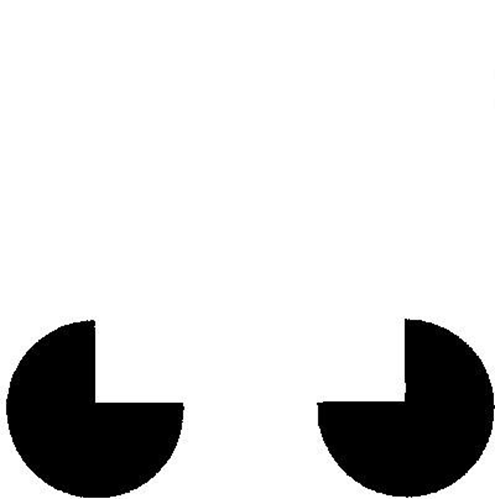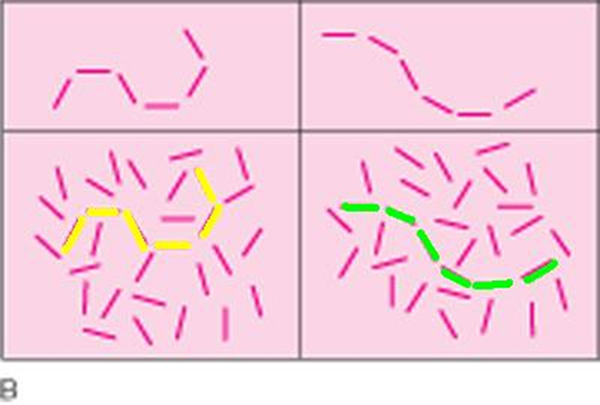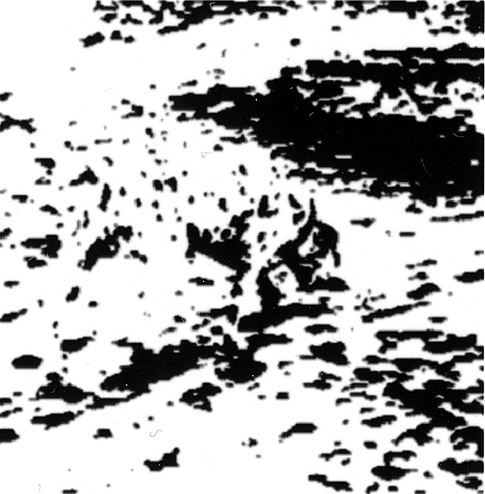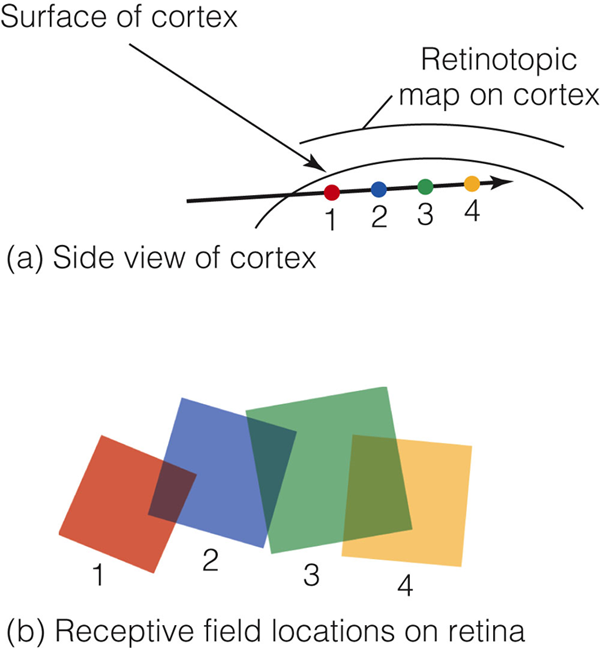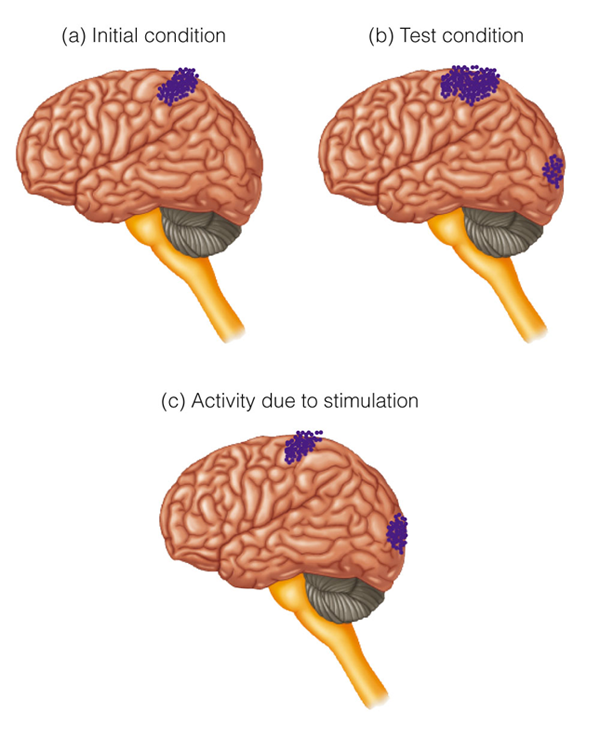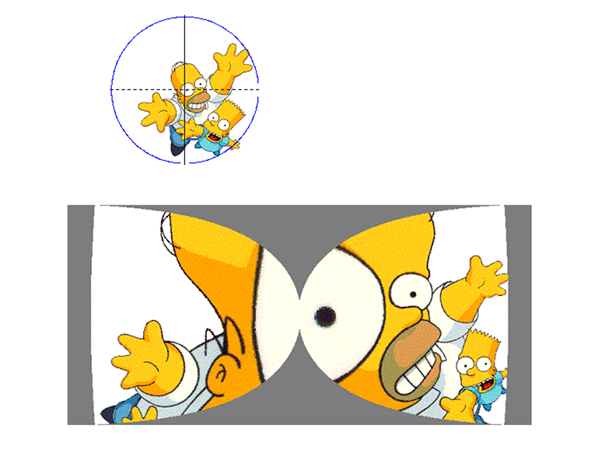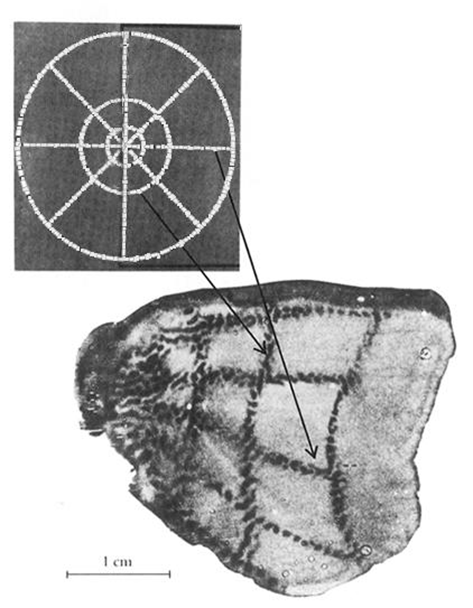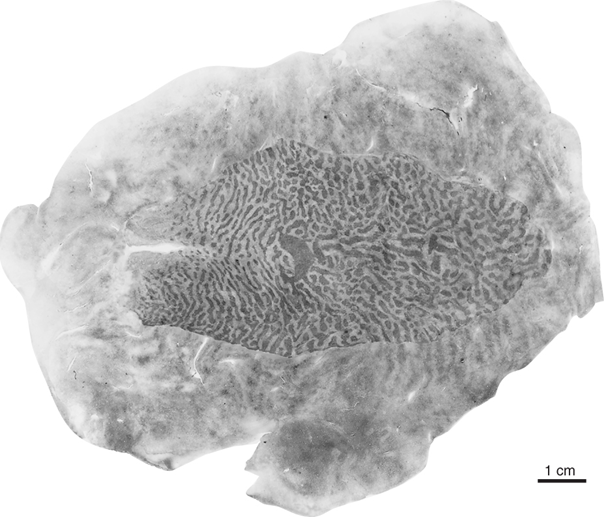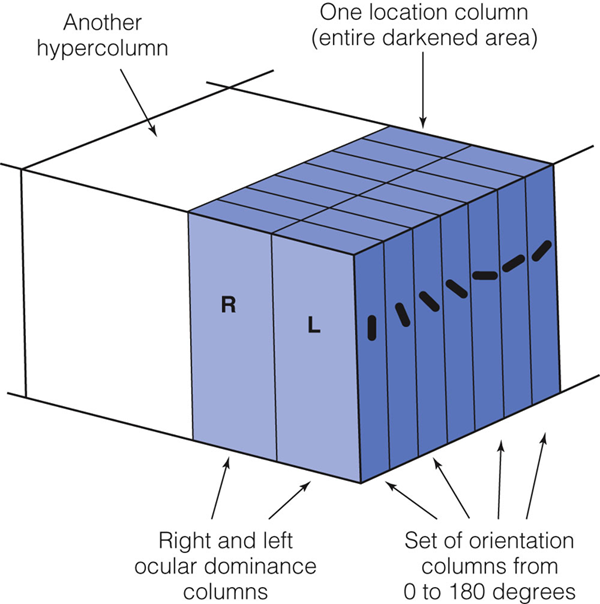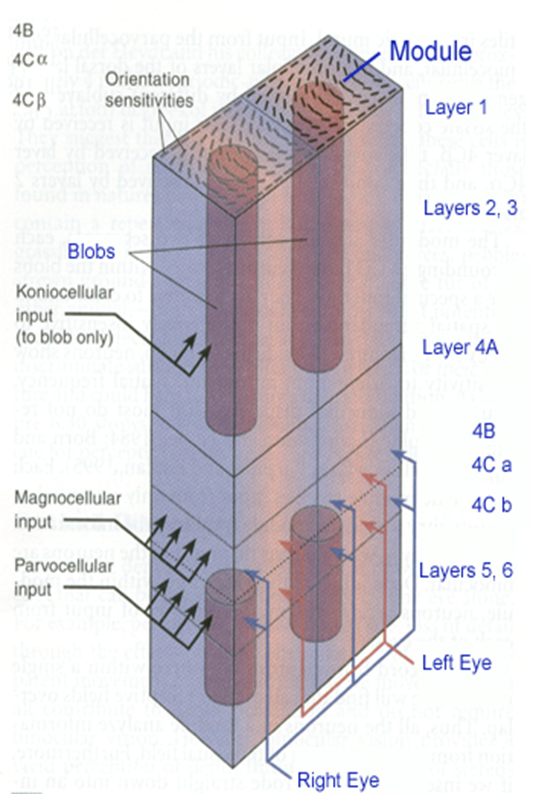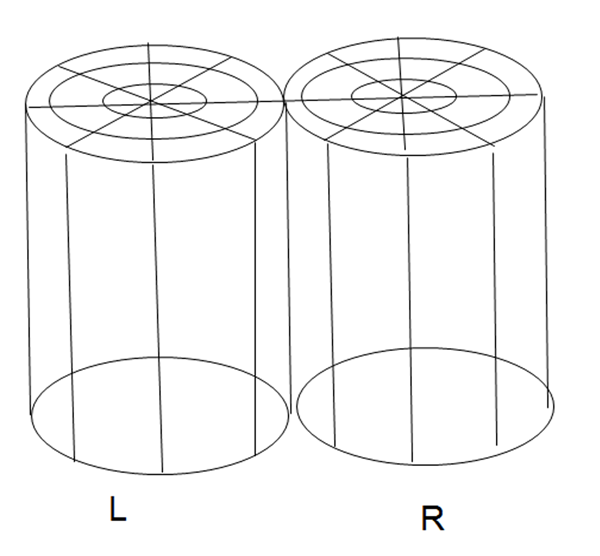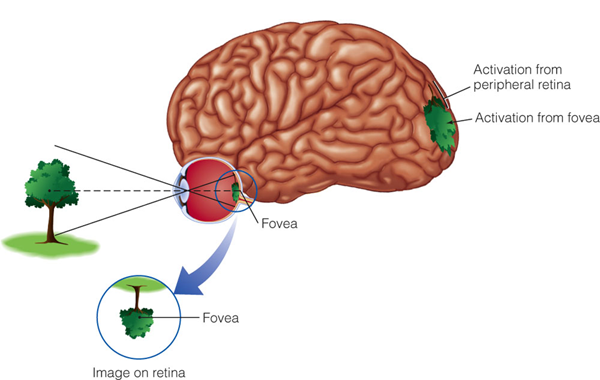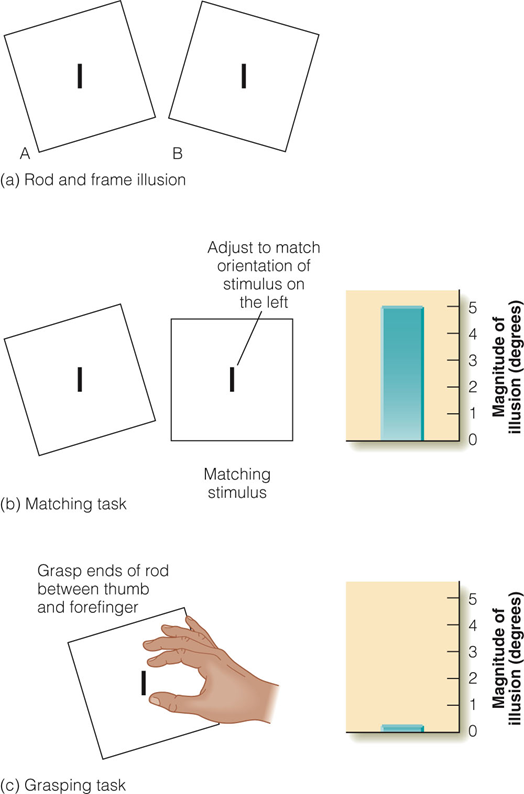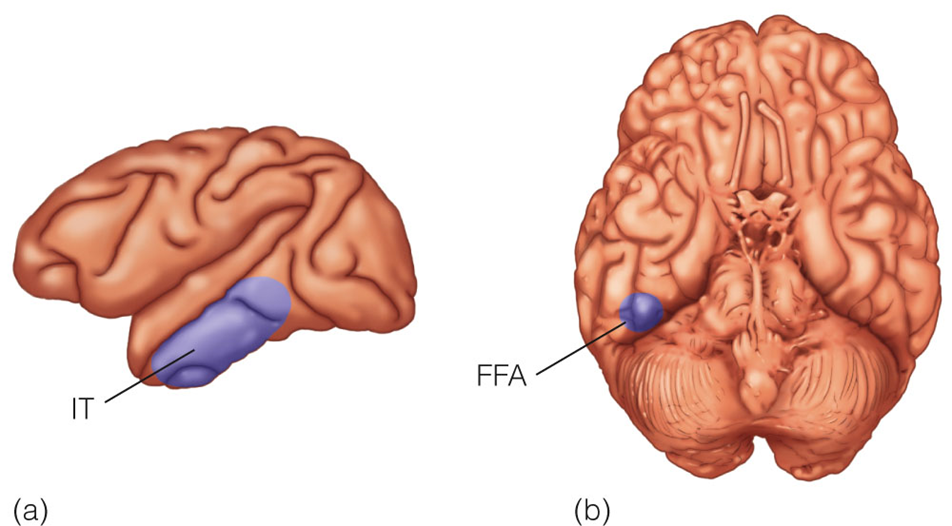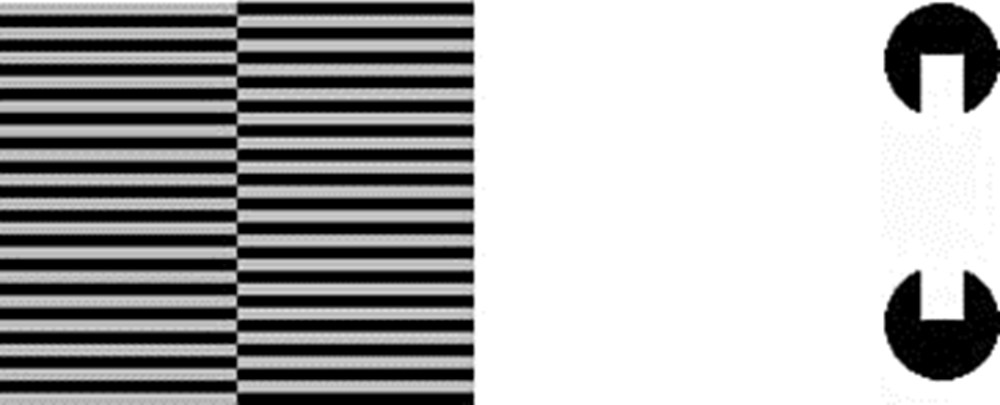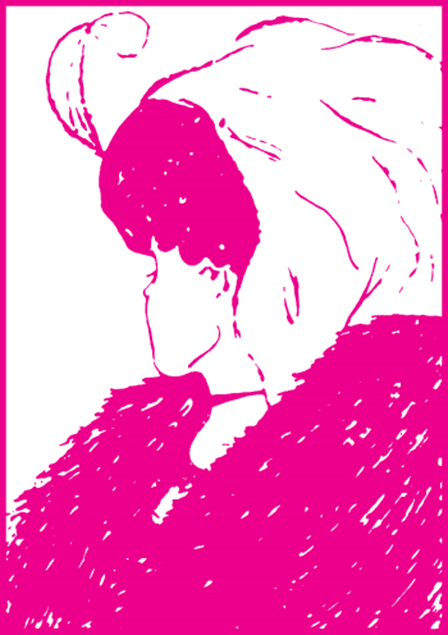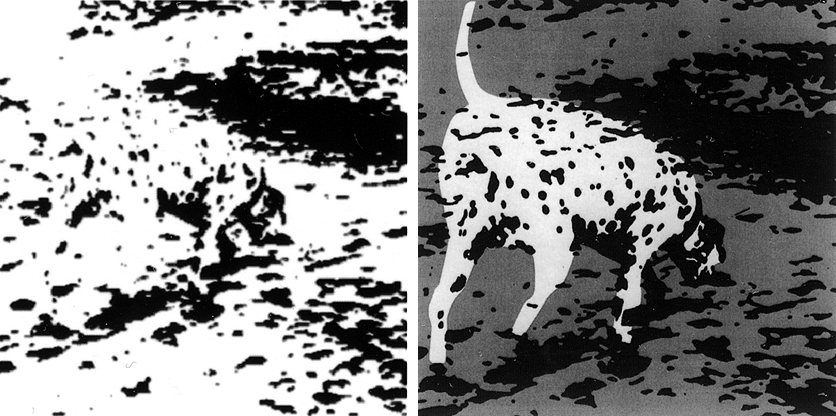第四講:Cortical Organization
出自KMU Wiki
(修訂版本間差異)
| 在2013年11月5日 (二) 21:55所做的修訂版本 (編輯) Woody (對話 | 貢獻) (新頁面: ==Cortical Organization== ===Seeing as an active process=== *我們看東西是被動的嗎? **錯覺輪廓 illusory contour) ←上一個 |
當前修訂版本 (2015年10月6日 (二) 23:42) (編輯) (撤銷) Momok (對話 | 貢獻) (→腦內空間組織) |
||
| (36個中途的修訂版本沒有顯示。) | |||
| 第1行: | 第1行: | ||
| ==Cortical Organization== | ==Cortical Organization== | ||
| - | + | ==Seeing as an active process== | |
| *我們看東西是被動的嗎? | *我們看東西是被動的嗎? | ||
| **錯覺輪廓 illusory contour | **錯覺輪廓 illusory contour | ||
| + | [[Image:04illusory contour.png]] | ||
| + | |||
| + | *差在那裡? | ||
| + | **邊界傾斜 | ||
| + | [[Image:04Seeing as an active process2.png]] | ||
| + | |||
| + | *雙可圖形 | ||
| + | **Rubin's vase | ||
| + | [[Image:04Seeing as an active process 3.png]] | ||
| + | |||
| + | *視覺解釋及記憶 | ||
| + | [[Image:04Seeing as an active process 4.png]] | ||
| + | |||
| + | *前面四張圖的結論 | ||
| + | **我們所見不是只有光學影像本身我們用眼睛及再加....來看本章主題就是........是什麼? | ||
| + | |||
| + | ==腦內空間組織== | ||
| + | *參照第76頁 封面 | ||
| + | *參照第78頁 figure 4.1 | ||
| + | ===Maps in Striate Cortex=== | ||
| + | *大腦皮質部 | ||
| + | **Columnar structure | ||
| + | **功能上(似乎解剖上亦是)在皮質區有一類型的組織稱為柱狀組織(columnar structure) | ||
| + | **同柱狀中之細胞功能類似 | ||
| + | **不同柱狀間功能有差異 | ||
| + | *研究方法 | ||
| + | **single cell recording (早期) | ||
| + | **brain imaging (近期) | ||
| + | ===Hubel and Wiesel (1965)實驗結果=== | ||
| + | [[Image:04Maps in Striate Cortex.png]] | ||
| + | *參照第78頁 figure 4.2 | ||
| + | ===Brain Imaging=== | ||
| + | *PET ( positron emission ) | ||
| + | **正子電腦斷層掃描 | ||
| + | *fMRI ( functional magnetic resonance imaging ) | ||
| + | **功能性磁振造影 | ||
| + | *方法 | ||
| + | **subtraction technique | ||
| + | **減法! | ||
| + | ===Brain scanning=== | ||
| + | **參照第79頁 figure 4.2 | ||
| + | *subtraction technique | ||
| + | [[Image:04subtraction technique.png]] | ||
| + | *Retinotopic maps and Cortical magnification factor by brain imaging | ||
| + | *參照第79頁 figure 4.3 | ||
| + | ===Cortical magnification 示意圖=== | ||
| + | *參照第80頁 figure 4.5 | ||
| + | ====Topographic map in cortex==== | ||
| + | [[Image:04Topographic map in cortex.png]] | ||
| + | ===cortical magnification 實驗=== | ||
| + | [[Image:042-deoxyglucose.png]] | ||
| + | |||
| + | ==Columnar Structure== | ||
| + | *Hubel and Wiesel 所整理 | ||
| + | **location column | ||
| + | **orientation column | ||
| + | **ocular dominance column | ||
| + | *Hypercolumn | ||
| + | *location column之同一location例 | ||
| + | *參照第80頁 figure 4.6 | ||
| + | *orientation column之一例 | ||
| + | *參照第81頁 figure 4.7 | ||
| + | *orientation column 當電極斜插時 | ||
| + | *參照第81頁 figure 4.8 | ||
| + | ===Orientation columns in a Location column=== | ||
| + | *參照第81頁 figure 4.9 | ||
| + | ===ocular dominance column(單眼優勢)=== | ||
| + | [[Image:04ocular dominance column.png]] | ||
| + | *Hubel and Wiesel 之Hypercolumn | ||
| + | [[Image:04Hypercolumn.png]] | ||
| + | *color | ||
| + | **blobs cell 泡泡細胞 | ||
| + | [[Image:04blobs cell.png]] | ||
| + | ===Columns and hypercolumns=== | ||
| + | *Hypercolumn by De Valois and De Valois | ||
| + | [[Image:04Hypercolumn by De Valois and De Valois.png]] | ||
| + | ===Representation in V1=== | ||
| + | *Representation | ||
| + | **假想在各層次之資訊表達的方式 | ||
| + | **亦可視為「計算過程」 | ||
| + | ***希望把資訊由硬體(大腦)獨立出來,即可由不同的硬體(如電腦)表現同質的東西 | ||
| + | *實際表現 | ||
| + | **大腦神經興𡚒情況 | ||
| + | *Representation示意圖 | ||
| + | [[Image:04Representation.png]] | ||
| + | ===Scenes in V1=== | ||
| + | *參照第82頁 figure 4.10 | ||
| + | *參照第82頁 figure 4.11 | ||
| + | *參照第82頁 figure 4.12 | ||
| + | |||
| + | ==Streams== | ||
| + | *Neural Pathway | ||
| + | **大腦中資訊流向 | ||
| + | **What, Where and How | ||
| + | *Dorsal pathway | ||
| + | **Where and How | ||
| + | *Ventral pathway | ||
| + | **What | ||
| + | *Brain Ablation | ||
| + | *參照第83頁 figure 4.13 | ||
| + | ===Visual pathway=== | ||
| + | *參照第84頁 figure 4.14 | ||
| + | ===Dorsal 與Ventral怎麼分?=== | ||
| + | *參照第84頁 figure 4.15 | ||
| + | |||
| + | ==Neuropsychology== | ||
| + | *神經心理學 | ||
| + | **不是生理心理學 | ||
| + | *Dissociation | ||
| + | **p. 85 table 4.1 | ||
| + | **single / double dissociation | ||
| + | **單一人/多個人 | ||
| + | *參照第85頁 table 4.1 | ||
| + | *D.F.的例子 | ||
| + | *參照第85頁 figure 4.16 | ||
| + | *rod and frame illusion 可以應用在正常人上的多種管道現象 | ||
| + | [[Image:04rod and frame.png]] | ||
| + | *另一個正常人實驗 | ||
| + | *參照第86頁 figure 4.17 | ||
| + | |||
| + | ==Modularity== | ||
| + | *在striate cortex之後尤其在IT (inferotemporal cortex) | ||
| + | **有針對複雜刺激反應的區域 | ||
| + | **如 | ||
| + | ***FFA (fusiform face area)臉 | ||
| + | ***PPA (parahippocampal place area)空間配置 | ||
| + | ***EBA (extrastriate body area)去除臉的身體 | ||
| + | *且這些地方異常會出問題 | ||
| + | **prosopagnosia 面孔失認 | ||
| + | ===Tanaka (1991)的研究=== | ||
| + | *參照第87頁 figure 4.18 | ||
| + | |||
| + | ===IT與FFA的位置=== | ||
| + | [[Image:04IT&FFA.png]] | ||
| + | |||
| + | ===FFA 在fMRI 的表現=== | ||
| + | *參照第87頁 figure 4.19 | ||
| + | |||
| + | ===也是在IT=== | ||
| + | *參照第88頁 figure 4.20 | ||
| + | *Face, body, places | ||
| + | *參照第88頁 figure 4.21 | ||
| + | *更進一步腦內反應 | ||
| + | *參照第89頁 figure 4.22 | ||
| + | |||
| + | ===Vision與 Memory=== | ||
| + | *參照第90頁 figure 4.23 | ||
| + | *Neuron in MTL | ||
| + | *參照第90頁 figure 4.24 | ||
| + | |||
| + | ===神經如何特化=== | ||
| + | *Neural Specialization | ||
| + | **neural selectivity by Evolution | ||
| + | ***theory of natural selection | ||
| + | **neural shaped by Experience | ||
| + | ***Gauthier et. al. (1999) | ||
| + | ***“Greeble | ||
| + | ===Greebles 的辨識之腦中表現在訓練前後=== | ||
| + | *參照第91頁 figure 4.25 | ||
| + | |||
| + | ==high order vision== | ||
| + | *vision is constructive(視覺是建構的) | ||
| + | [[Image:04vision is constructive.png]] | ||
| + | *context dependent 情境相依 | ||
| + | [[Image:04context dependent.png]] | ||
| + | *integration of local features(整合局部特徵) | ||
| + | [[Image:04integration of local features.png]] | ||
| + | *這是手指嗎? | ||
| + | *參照第92頁 figure 4.26 | ||
| + | *返回[[知覺心理學]] | ||
當前修訂版本
目錄 |
[編輯] Cortical Organization
[編輯] Seeing as an active process
- 我們看東西是被動的嗎?
- 錯覺輪廓 illusory contour
- 差在那裡?
- 邊界傾斜
- 雙可圖形
- Rubin's vase
- 視覺解釋及記憶
- 前面四張圖的結論
- 我們所見不是只有光學影像本身我們用眼睛及再加....來看本章主題就是........是什麼?
[編輯] 腦內空間組織
- 參照第76頁 封面
- 參照第78頁 figure 4.1
[編輯] Maps in Striate Cortex
- 大腦皮質部
- Columnar structure
- 功能上(似乎解剖上亦是)在皮質區有一類型的組織稱為柱狀組織(columnar structure)
- 同柱狀中之細胞功能類似
- 不同柱狀間功能有差異
- 研究方法
- single cell recording (早期)
- brain imaging (近期)
[編輯] Hubel and Wiesel (1965)實驗結果
- 參照第78頁 figure 4.2
[編輯] Brain Imaging
- PET ( positron emission )
- 正子電腦斷層掃描
- fMRI ( functional magnetic resonance imaging )
- 功能性磁振造影
- 方法
- subtraction technique
- 減法!
[編輯] Brain scanning
- 參照第79頁 figure 4.2
- subtraction technique
- Retinotopic maps and Cortical magnification factor by brain imaging
- 參照第79頁 figure 4.3
[編輯] Cortical magnification 示意圖
- 參照第80頁 figure 4.5
[編輯] Topographic map in cortex
[編輯] cortical magnification 實驗
[編輯] Columnar Structure
- Hubel and Wiesel 所整理
- location column
- orientation column
- ocular dominance column
- Hypercolumn
- location column之同一location例
- 參照第80頁 figure 4.6
- orientation column之一例
- 參照第81頁 figure 4.7
- orientation column 當電極斜插時
- 參照第81頁 figure 4.8
[編輯] Orientation columns in a Location column
- 參照第81頁 figure 4.9
[編輯] ocular dominance column(單眼優勢)
- Hubel and Wiesel 之Hypercolumn
- color
- blobs cell 泡泡細胞
[編輯] Columns and hypercolumns
- Hypercolumn by De Valois and De Valois
[編輯] Representation in V1
- Representation
- 假想在各層次之資訊表達的方式
- 亦可視為「計算過程」
- 希望把資訊由硬體(大腦)獨立出來,即可由不同的硬體(如電腦)表現同質的東西
- 實際表現
- 大腦神經興𡚒情況
- Representation示意圖
[編輯] Scenes in V1
- 參照第82頁 figure 4.10
- 參照第82頁 figure 4.11
- 參照第82頁 figure 4.12
[編輯] Streams
- Neural Pathway
- 大腦中資訊流向
- What, Where and How
- Dorsal pathway
- Where and How
- Ventral pathway
- What
- Brain Ablation
- 參照第83頁 figure 4.13
[編輯] Visual pathway
- 參照第84頁 figure 4.14
[編輯] Dorsal 與Ventral怎麼分?
- 參照第84頁 figure 4.15
[編輯] Neuropsychology
- 神經心理學
- 不是生理心理學
- Dissociation
- p. 85 table 4.1
- single / double dissociation
- 單一人/多個人
- 參照第85頁 table 4.1
- D.F.的例子
- 參照第85頁 figure 4.16
- rod and frame illusion 可以應用在正常人上的多種管道現象
- 另一個正常人實驗
- 參照第86頁 figure 4.17
[編輯] Modularity
- 在striate cortex之後尤其在IT (inferotemporal cortex)
- 有針對複雜刺激反應的區域
- 如
- FFA (fusiform face area)臉
- PPA (parahippocampal place area)空間配置
- EBA (extrastriate body area)去除臉的身體
- 且這些地方異常會出問題
- prosopagnosia 面孔失認
[編輯] Tanaka (1991)的研究
- 參照第87頁 figure 4.18
[編輯] IT與FFA的位置
[編輯] FFA 在fMRI 的表現
- 參照第87頁 figure 4.19
[編輯] 也是在IT
- 參照第88頁 figure 4.20
- Face, body, places
- 參照第88頁 figure 4.21
- 更進一步腦內反應
- 參照第89頁 figure 4.22
[編輯] Vision與 Memory
- 參照第90頁 figure 4.23
- Neuron in MTL
- 參照第90頁 figure 4.24
[編輯] 神經如何特化
- Neural Specialization
- neural selectivity by Evolution
- theory of natural selection
- neural shaped by Experience
- Gauthier et. al. (1999)
- “Greeble
- neural selectivity by Evolution
[編輯] Greebles 的辨識之腦中表現在訓練前後
- 參照第91頁 figure 4.25
[編輯] high order vision
- vision is constructive(視覺是建構的)
- context dependent 情境相依
- integration of local features(整合局部特徵)
- 這是手指嗎?
- 參照第92頁 figure 4.26
- 返回知覺心理學
